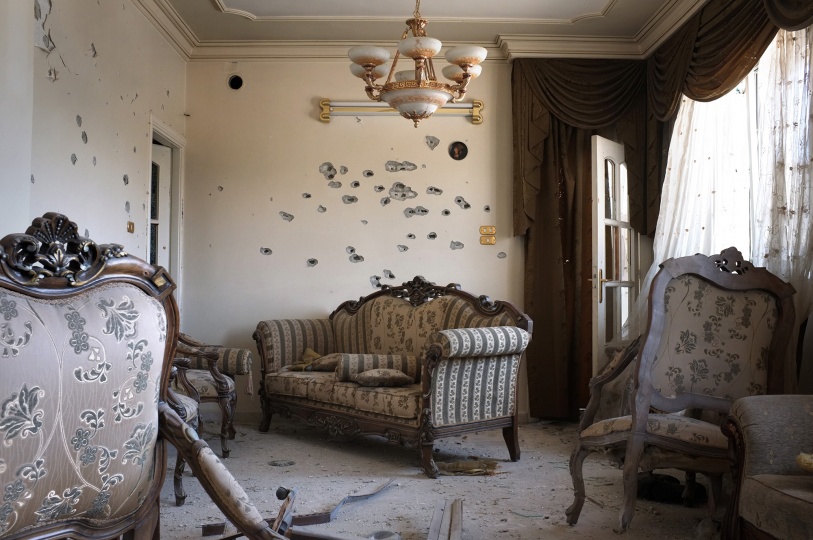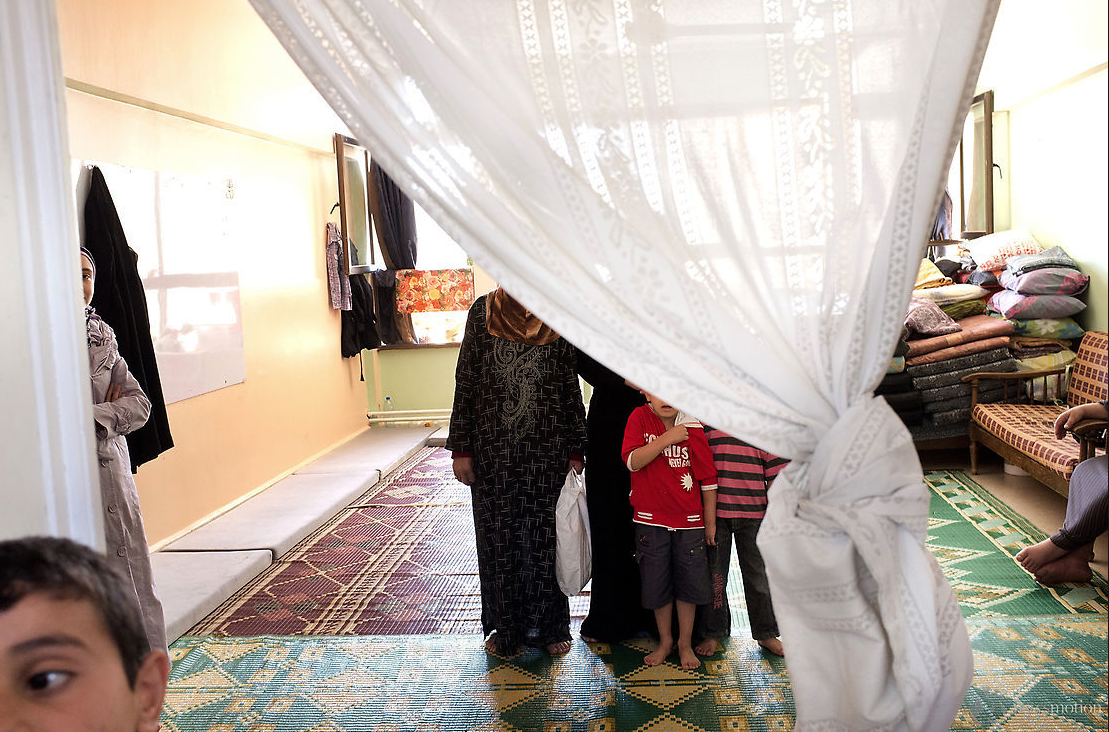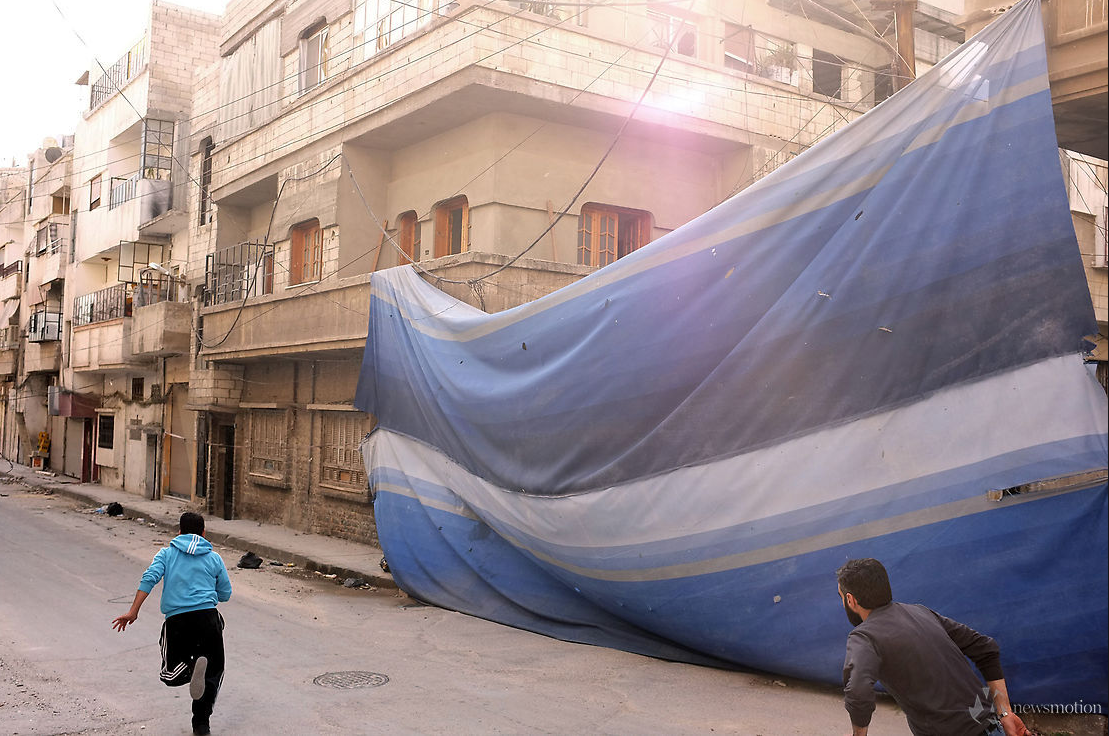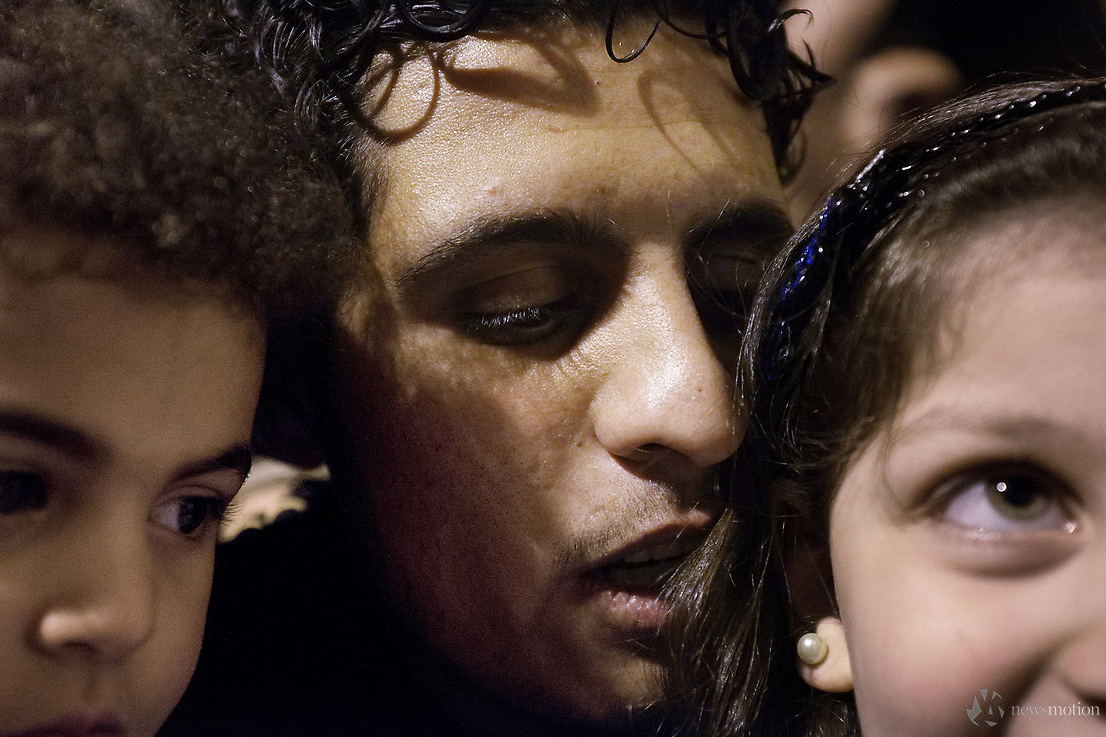Under the Radar In Syria
As revolutions spread across the Middle East in 2011, Syrian American author and Dart Fellow Alia Malek decided to leave New York and move to Damascus, where her family had a home. In an interview with the Dart Center, she talks about the Syrian media, misunderstandings about the conflict, and living undercover. With photos by David Degner.

As revolutions spread across the Middle East in 2011, Syrian American author Alia Malek decided to leave New York and move, at least temporarily, to Damascus, where her family had a home. The civil war had not yet begun, and though anger and unrest were growing, the city also had its comforts. “Our street is narrow, and one can easily talk to the neighbors across the way on their balconies,” she wrote in a recent New York Times story about her experience. “We saw one another there every day — when we had our morning coffee, still in our bathrobes; when we wrung and hung the laundry at midday; when we smoked an afternoon cigarette; when we watered the plants at sunset; and when we cracked sunflower seeds and gossiped at night.”
Things changed more quickly and brutally than she expected. She kept private her journalism work, but her eyes and ears remained open as the country’s fate darkened. She spoke to the Dart Center’s Julian Rubinstein about the Syrian media, how misunderstandings about Syria’s sectarianism have festered; and the roles foreign and social media have played in the conflict. (Malek's book, "A Country Called Amreeka," an alternative history of the U.S. through the eyes of Arab Americans, is available in paperback.)
Their conversation is accompanied by photos by David Degner, an American documentary photojournalist living in Cairo, who worked with Malek, and risked his life to enter Syria and photograph the rebel stronghold in Homs for a story that appeared on Newsmotion.org.

Julian Rubinstein: You’re Syrian American, and still have family in Damascus, but you were living and working here in New York. What made you decide to move back to Syria and what was it like when you got there?
Alia Malek: This was April, 2011. It wasn’t a war yet. I had always wanted to do a big project on Syria. I wanted to see what would happen beyond Egypt. Because of the news peg, there was a possibility that a market had opened up. I went there ostensibly renovating my family’s house, but I was also researching a book, something that would have more longevity rather than just news of what was going on right then.
JR: Still you were a foreign journalist in a place that was about to crack down in a major way on foreign journalists. How did you handle that?
AM: I went there with a lot of optimism, although knowing that the regime had a history of being brutal. I didn’t foresee how brutal it was going to get and where it was going to go. But I didn’t hold myself out as a journalist, so it didn’t affect me much. There was a lot of suspicion of me, like, Why would somebody opt into this? There was some suspicion I was CIA.
JR: Did you run into situations when you were actually questioned by anyone official?
AM: No. I was able to fly under the radar, or they figured I wasn’t worth their time. I had been there long enough to meet enough contacts to become part of the society. I did a couple of stories, but I was able to do the stories I wanted to do.
JR: What was the content and tenor of the state-controlled media when you arrived, and when did it start to change?
AM: State-controlled media had its own narrative, and people forget that the regime was fighting for domestic legitimacy. They were able to spin the narrative to their favor. They managed to harp on things that had some truth: For example, there is foreign intervention by Western powers and Gulf powers; and the U.S. has lied before, particularly when it came to Iraq and WMDs, which enabled them to piece together a narrative that wasn’t inconceivable .
I call it an exaggerated Stockholm Syndrome. People did not necessarily want to believe what was right in their face. Syria is between Iraq and Lebanon, and those countries’ histories meant that it was a very imaginable reality for Syrians of what could happen.
Folks knew or had an understanding or tangible examples of what could go wrong in chaos – don’t forget that Syria absorbed fleeing Lebanese and Iraqis and Palestinians before that. Even though you knew what you what you were watching was a blatant lie, if you wanted to believe it, you could hold onto something.

Residents of Khadelye hang sheets across streets so they can run across without being hit by snipers. (David Degner)
JR: When the revolution started, who were the people at the forefront and how did it change?
AM: At the beginning, this was started by civil society folks. People had been working for years, trying to maneuver in a very tight space. The regime had always recognized that any kind of civil society initiatives would lead to solidarity across societal lines and that was something they were keen to prevent. So they would control charitable or civic minded activities: a tree planting campaign a few years ago was co-opted, or very much controlled, by the government under the guise of benevolent institutions.
The regime reacted with a scorched earth policy. I didn’t expect it. In the chaos, many other people entered the fray and chose to respond in ways that include violence. But those were not the people initially involved.
JR: As journalists became targets of the regime, how did coverage and understanding of the increasingly complex rebellion change?
AM: Don’t forget that everybody in Syria has satellites. So people had access to other sources. You could get your Al Jazeera or CNN. It was never a full shut down. If you wanted to get an approximation of the truth, you would watch how Al Jazeera covered it, Russia Today, BBC, the way state TV covered it, and you could piece together the truth by seeing all the different versions.
JR: And what about outside the country, as foreign journalists became more limited in their movements.
AM: When Marie Colvin was killed, they knew they were hitting that media center in Homs. It was only when the border fell in the north did you have people sneaking in all the time. And then we’re relying on people who are coming in across the border, don’t know the historical, political or other context, and who are constantly reliant on interpreters.
I think one of problems with journalism is that people go from one region to another. It takes a long time to understand what’s going on. I know how a lot of journalism is being produced. You go into chat rooms, you get put in touch with activists who will arrange everything once you get there.
There has been some good journalism. I think Rania Abouzeid has done a really good job. I think Anthony Shadid did a great job. BBC’s Ian Pannell has done good work. The Economist’s correspondent as well. I like to think my work has been ok. And I don’t want to speak ill of people who have been kidnapped and people who have died, these people take huge risks. But I don’t understand, what value are they exactly adding to the story? I wonder about the sort of egoism that says, I need to see it.
I guess a question that really is for journalists: Is covering one country just like covering another? War is very context specific, and outlets like Vice, that romanticize war or make war a pop experience, are doing their readers a disservice, let alone utterly failing the Syrian people.

A well-known wedding singer whispers the words of a revolutionary song into the ears of children. (David Degner)
JR: We hosted a group of Syrian journalists recently at Columbia. One of the things they talked about was the impact of citizen type journalism, non-traditional media, such as illegal short wave radio station. How did those efforts change the quality of available information?
AM: People have risked their lives to produce journalism without the equipment or training or support that it takes. They should be commended.
As for Twitter and Facebook and Youtube -- Western outlets were more willing to use these in their journalism. But I think we need to remember that it is certain people who have access to getting their message out that way. It amplifies certain voices but not all voices. I think that’s important to remember.
In light of this there’s been real efforts, like the guys at Storyful, to verify videos, match it up with news reports. It’s critical in some ways because it’s the only record or chronicle of what’s going on. That’s a valuable addition.
But I feel like a lot of work on Syria has been done through a peephole. There was a failure to note that even though we have this sectarian dimension, this isn’t where it started. I don’t know that the story’s only happening in factions. I think that’s part of the story, and I think we give that much greater weight than the disintegration of the state and the fragmentation of society. I don’t think you see that.
JR: I remember being there in 2010. In the old city, don’t remember which quarter, I was in bars, there was singing, dancing, you could walk around and not feel any danger. In terms of regular life on the street, did that continue?
AM: Yeah, it still does. It’s just smaller and smaller. More localized. Some bars are still open. I think it’s also a coping mechanism, trying to maintain as much normalcy as possible.
Let me put it this way: Any society can disintegrate. I no longer believe that this is just something that happens in other places. I’m not betting or praying for it to happen here. But I think people in the the former Yugoslavia, for example, didn’t think it would happen. One day it changes and then all of a sudden the ugliness of humanity becomes a daily reality. There might have been a role for the regime to play in Syria’s transition back in 2011, but now I think it’s not possible for this family not to find itself murdered in the streets.
Slideshow by David Degner first appeared in Newsmotion.org.


































































































